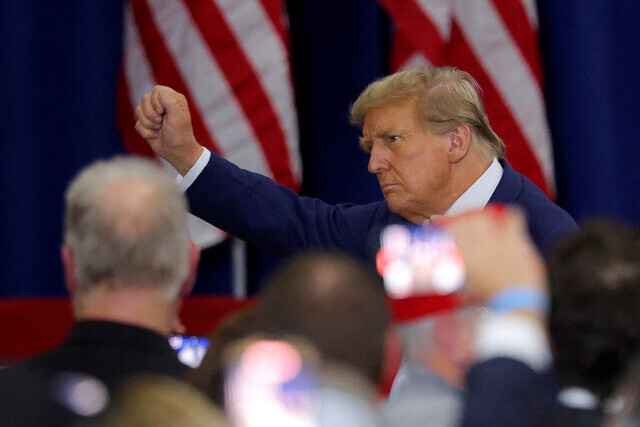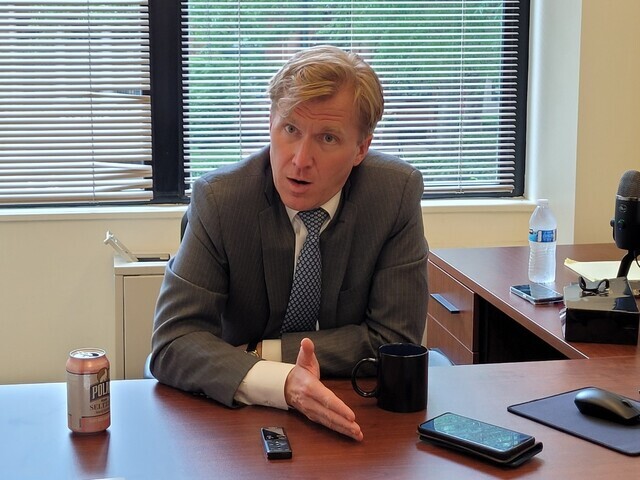hankyoreh
Links to other country sites 다른 나라 사이트 링크
Nuclear South Korea? The hidden implication of hints at US troop withdrawal

Leading up to the US presidential election, Republican Party candidate Donald Trump and his advisers have been repeatedly hinting at pulling US troops out of the Korean Peninsula. While this could be an “art of the deal” tactic designed to pressure South Korea to shoulder more of the defense burden, experts say that Seoul needs to be prepared for indications that the US may adjust its grand strategy in a way that could have major ramifications for Korea’s national security.
“US forces on the peninsula, in my view, should not be held hostage to dealing with the North Korean problem because that is not the primary issue for the US,” said Elbridge Colby, the former US deputy assistant secretary of defense for strategy and force development, in an interview with Yonhap News on Monday.
“South Korea is going to have to take primary, essentially overwhelming responsibility for its own self-defense against North Korea,” Colby said, adding that he would not leave US troops in Korea if it were up to him.
Colby is a defense expert who has been mentioned as a potential candidate for national security adviser if Trump returns to the White House.
In an interview with Time Magazine that went to press on April 30, Trump reiterated his negative view of the presence of US troops in Korea. “Why would we defend somebody?” he asked, calling Korea a “very wealthy country” and asking, “Why wouldn’t they want to pay?”
When a Time reporter asked Trump if he planned to withdraw American troops from Korea, he said, “I want South Korea to treat us properly. [. . .] I had negotiations, because they were paying virtually nothing for 40,000 troops that we had there.”
While Trump referred to this 40,000 figure multiple times in the interview, the actual number of US troops stationed in Korea is 28,500.
The hints by Trump and major figures in his circle about reducing or withdrawing US troops from Korea seems to mainly represent a demand for Seoul to increase its share of the cost of mutual defense, an issue referred to as burden-sharing. While Trump was in office, he tried to push through a massive increase in Seoul’s defense contribution. That’s also the negotiating strategy he used when he asked NATO member states to increase their defense budgets.
The possibility of Trump returning to power is also apparently why the US and Korea have already begun negotiating their next burden-sharing agreement, even though the current 11th ROK-US Special Measures Agreement doesn’t expire until the end of next year.
Nevertheless, Korea shouldn’t ignore the fundamental changes that are underway in the US’ strategy amid the bigger trends of changing politics inside the US and Washington’s intensifying rivalry with Beijing.

As US focuses energy on China, Korea may have to fend for itself
In the interview with Yonhap News and elsewhere, Colby has consistently argued that the US needs to concentrate its energy on confronting China, which is its biggest threat, and that Korea should be left to deal with the threat posed by North Korea on its own.
“The US basically wants to stop stationing large numbers of troops near the DMZ to serve as a ‘tripwire’ as they did during the Cold War and to have South Korea handle nearly all the defense against the North while paying more of the defense burden. It’s time to recognize that as the US refocuses its grand strategy on China, the overall nature of its East Asian alliances is changing, and the nature of US Forces Korea will change, too. It’s also time we made the necessary preparations,” said Cha Tae-suh, a professor of political science and foreign relations at Sungkyunkwan University.
In the same interview, Colby said the US should return operational control over South Korean troops to Seoul as soon as possible. This strong push for such an OPCON transfer from an American conservative contrasts sharply with Korean conservatives’ long-standing opposition to that initiative.
Colby also said he wouldn’t rule out South Korea’s nuclear armament, noting that the US wouldn’t protect South Korea from a North Korean nuclear attack if that meant losing “multiple American cities.”
“There’s an interesting parallel here to when South Korea attempted to develop nuclear weapons after the Nixon administration drew down its troops in Korea in the 1970s, at a time of declining American power,” noted Cha, the professor.
Cha’s remarks also raise the possibility that calls for South Korea to arm itself with nukes could go mainstream if Trump wins a second term while North Korea’s nuclear threat remains so serious.
Nobody can predict how the US presidential election will turn out, and it’s unclear whether Trump, if elected, would actually carry out his Korean Peninsula policies. Nevertheless, Koreans cannot disregard the fact that such opinions are gradually gaining more of an audience inside the US. The changes that are underway are far too great and perilous for Koreans to hide their heads in the sand.
By Park Min-hee, senior staff writer
Please direct questions or comments to [english@hani.co.kr]

Editorial・opinion
![[Column] Tariffs on China: Trump was dumb, Biden dumber [Column] Tariffs on China: Trump was dumb, Biden dumber](https://flexible.img.hani.co.kr/flexible/normal/500/300/imgdb/original/2024/0520/191716191153918.jpg) [Column] Tariffs on China: Trump was dumb, Biden dumber
[Column] Tariffs on China: Trump was dumb, Biden dumber![[Column] What if Seoul took reunification by force off the table? [Column] What if Seoul took reunification by force off the table?](https://flexible.img.hani.co.kr/flexible/normal/500/300/imgdb/original/2024/0520/3017161928630494.jpg) [Column] What if Seoul took reunification by force off the table?
[Column] What if Seoul took reunification by force off the table?- [Editorial] Intensifying US-China rivalry means Seoul must address uncertainty with Beijing sooner than later
- [Column] When ‘fairness’ means hate and violence
- [Editorial] Yoon must stop abusing authority to shield himself from investigation
- [Column] US troop withdrawal from Korea could be the Acheson Line all over
- [Column] How to win back readers who’ve turned to YouTube for news
- [Column] Welcome to the president’s pity party
- [Editorial] Korea must respond firmly to Japan’s attempt to usurp Line
- [Editorial] Transfers of prosecutors investigating Korea’s first lady send chilling message
Most viewed articles
- 1Xi, Putin ‘oppose acts of military intimidation’ against N. Korea by US in joint statement
- 2Kim Jong-un wanted to meet with residents of shelled Yeonpyeong Island in South, Moon recalls in mem
- 3Berlin mayor hints at tearing down ‘comfort women’ memorial in city
- 4[Column] What if Seoul took reunification by force off the table?
- 5To weigh costs and benefits, Korea must stop treating US troop presence as a sacred cow
- 6For new generation of Chinese artists, discontent is disobedience
- 7[Column] Tariffs on China: Trump was dumb, Biden dumber
- 8China, Russia put foot down on US moves in Asia, ratchet up solidarity with N. Korea
- 9Putin’s trip to China comes amid 63% increase in bilateral trade under US-led sanctions
- 10[Exclusive] Unearthed memo suggests Gwangju Uprising missing may have been cremated